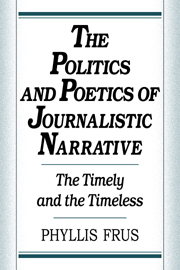Book contents
- Frontmatter
- Contents
- Preface: True Stories
- Acknowledgments
- Introduction: What Isn't Literature
- 1 Writing After the Fact: Crane, Journalism, and Fiction
- 2 “News That Stays”: Hemingway, Journalism, and Objectivity in Fiction
- 3 News That Fits: The Construction of Journalistic Objectivity
- 4 Other American New Journalisms: 1960s New Journalism as “Other”
- 5 The “Incredibility of Reality” and the Ideology of Form
- 6 Freud and Our “Wolfe Man”: The Right Stuff and the Concept of Belatedness
- Conclusion
- Notes
- Works Cited
- Index
1 - Writing After the Fact: Crane, Journalism, and Fiction
Published online by Cambridge University Press: 14 September 2009
- Frontmatter
- Contents
- Preface: True Stories
- Acknowledgments
- Introduction: What Isn't Literature
- 1 Writing After the Fact: Crane, Journalism, and Fiction
- 2 “News That Stays”: Hemingway, Journalism, and Objectivity in Fiction
- 3 News That Fits: The Construction of Journalistic Objectivity
- 4 Other American New Journalisms: 1960s New Journalism as “Other”
- 5 The “Incredibility of Reality” and the Ideology of Form
- 6 Freud and Our “Wolfe Man”: The Right Stuff and the Concept of Belatedness
- Conclusion
- Notes
- Works Cited
- Index
Summary
A man said to the universe:
“Sir, I exist!”
“However,” replied the universe,
“The fact has not created in me
A sense of obligation.”
– Stephen Crane, War Is KindIt is by now a common strategy of critics to set two works from the domains of fiction and nonfiction side by side in order to test the distinction between the two realms or to account for differences in terms of a particular theory. Two well-known exercises of this type are John Searle's comparison of a novel with a story from the New York Times (325–6) and Barbara Herrnstein Smith's juxtaposition of a biographical passage from a history and the similarly biographical introduction of the title character in Tolstoy's Death of Ivan Ilyich (29–30). Both critics decide that it is not possible to distinguish between the nonfictional example and the literary one on the basis of particular properties in the texts themselves. Instead, they conclude, evidence of a work's category must be gathered from other aspects of the discourses, such as expressions of authorial intention and their influence on the reader's decision about how to approach the work (for example, responding to the “frame”). The fictional work, in each case, is ultimately distinguished by its suspension of truth claims. While the factual text asserts propositions meant to be taken as meaningful, the fictional one only imitates “natural” discourse or only pretends to refer.
- Type
- Chapter
- Information
- The Politics and Poetics of Journalistic Narrative , pp. 13 - 52Publisher: Cambridge University PressPrint publication year: 1994



